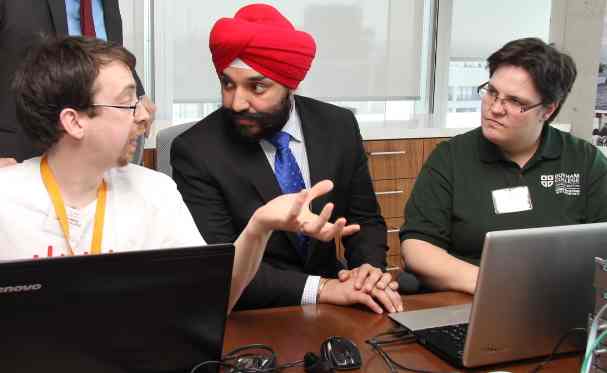
Innovation minister vows more federal support for indigenous and rural communities
TORONTO – Ottawa has not done its best to help bring broadband to remote native communities, Innovation Minister Navdeep Bains has suggested.
The previous Conservative government allocated over $270 million since 2014 under the Connecting Canadians program to help local providers bring high speed Internet to rural and outlying communities across the country, and the program has been taken over and recently added to by Liberal government.
However, Bains told reporters in Toronto on Friday during a visit to Cisco (It's a shame his visit didn't come after CRTC chairman Jean-Pierre Blais' Monday address) that "many aboriginal and indigenous communities were ignored, for what ever reason, and I don’t want to dwell on the past – there were some political issues – but we are absolutely committed to making sure the funding does flow to the communities that were left behind, particularly the indigenous communities. As we develop this broadband plan we will focus on that."
Bains made the comment after touring Cisco Systems Canada's innovation centre in Toronto, where one of the things he saw was a presentation on the networking company's pilot project to bring video conferencing to native high schools.
At a news conference after the tour a reporter pointed out to him that the troubled northern Ontario native community of Attawapiskat, in headlines now because it has declared a state of emergency, doesn't have broadband service.
Bains noted that in last month's Liberal budget $500 million over five years will be set aside to bring broadband to outlying schools, hospitals and libraries.
That's on top of $35 million the Liberals have added to the Connecting Canadians program, which will bring total spending under that program to $305 million.
"The idea (of the spending) is to really help address the digital divide that exists," Bains (pictured with students) said. "This has a significant impact on young people as we saw today, in terms of young people being able to learn, has a significant impact on businesses being able to do business online. So this is very important for the social and economic well being of these regions as well if we want Canada to thrive."
He noted the country is the second largest in the world but with a relatively small population, which is why it added the $500 million. Details of how that money will be allocated have yet to be announced.
This month the Liberals have made a slew of announcements under the Connecting Canadians program including $16 million to 10 B.C. Internet providers increase broadband Internet access for approximately 23,000 households throughout that province; up to $2.6 million to Northwestel Inc. to increase broadband Internet access for approximately 500 households in the north; up to $1.6 million for Xplorenet Communications to increase broadband Internet access for more than 12,000 households in communities throughout PEI; and $3.5 million to two providers in Newfoundland. Some of these projects are also being supported with provincial funds.
Bains' tour of Cisco came as the CRTC is holding a hearing addressing access to high speed broadband in northern, aboriginal and rural communities and others who can't afford broadband.
Among the presentations to him was a video explaining Cisco's Connected North pilot project, which in two and a half years has installed and help upgrade equipment in 15 schools and health centres in Nunavut, the Northwest Territories, Ontario, Saskatchewan, B.C and Alberta for video conferencing.
Cisco hopes to expand to 30 schools next year through partnerships with governments and other private sector partners. There are 600 aboriginal schools in Canada, noted Willa Black, Cisco Canada's vice-president of corporate communications
"Our vision is every aboriginal school in the country having a video conference capability," she said in an interview.
"Bandwidth is generally challenging. If the community has fibre and we can get 1.5 meg we're good to go. But if not we will approach the regional service providers and work with them. In the case of SSi Micro [which serves Nunavut and the Northwest Territories], they made a significant donation of bandwidth, and also provided bandwidth at a discounted level. In the case of K-Net [which services First Nations in Ontario] and SaskTel, they also are providing all of the bandwidth connectivity required to deliver that first class quality experience over prioritized bandwidth. It's been tremendous working with them."
For some projects there is provincial funding, she said. A donation from The Learning Partnership, a national charity that promotes public education, will help add two more schools to Cisco's program, she said.
But, Black added, "our challenge is really sustainability — we need to maintain those relationships, but we are looking at partnerships with (all levels of) government," She added. "We have a funding requirement. Cisco can't do it all."
Cisco hasn't formally asked Ottawa for funding, a company spokesperson said.




